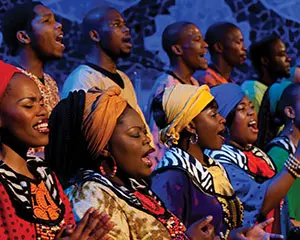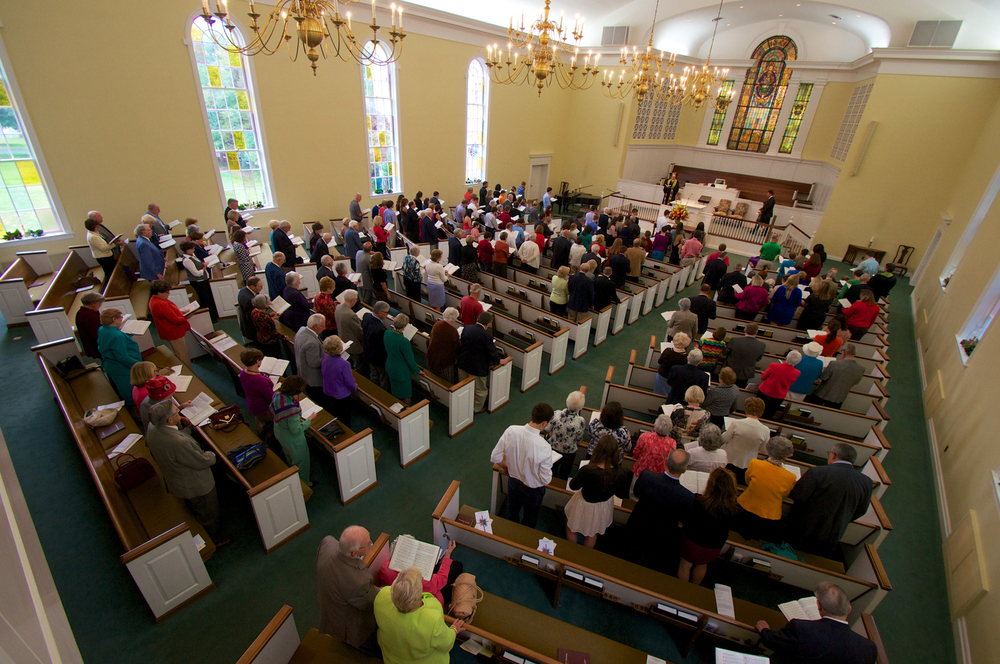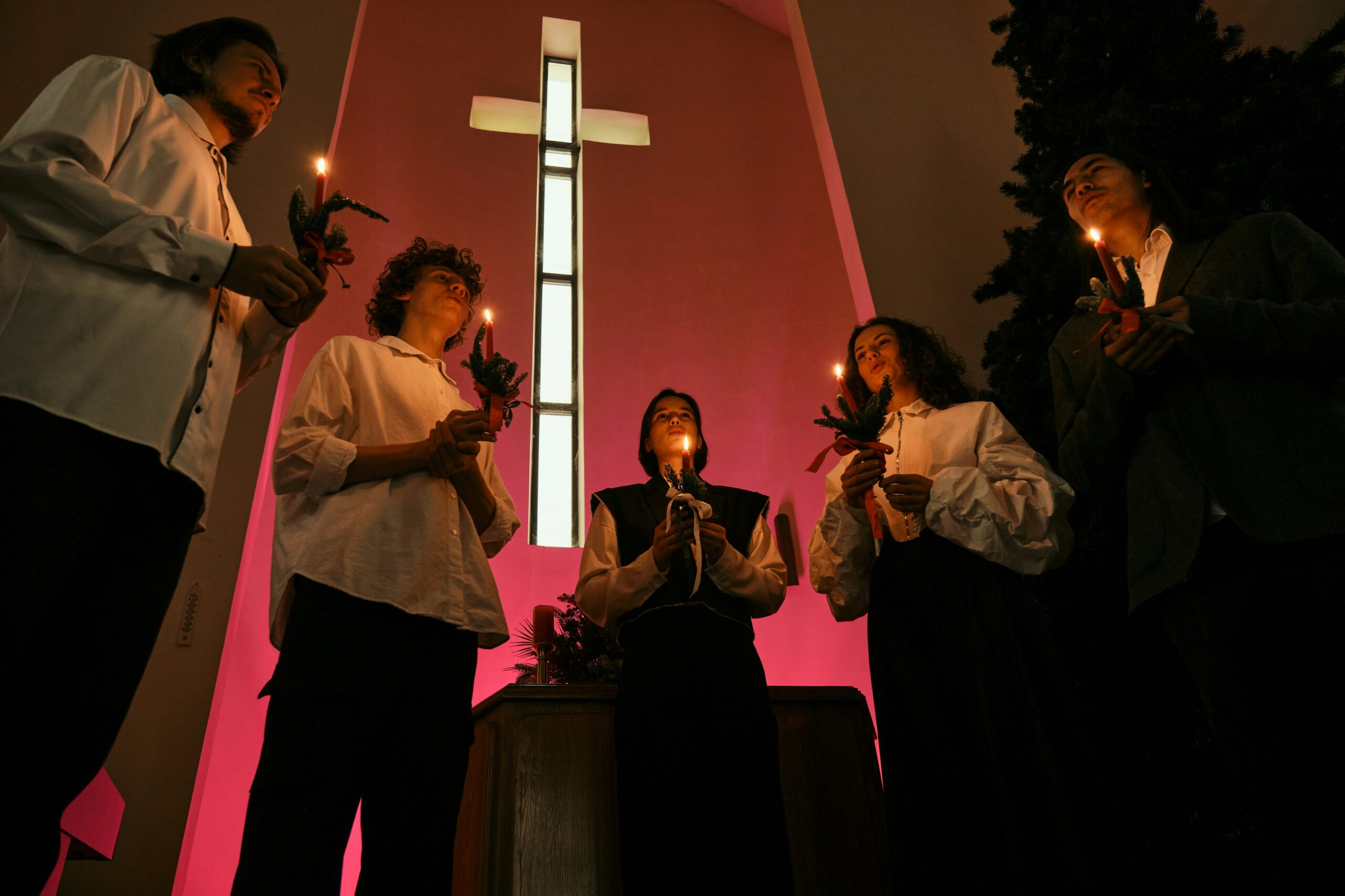Over the past few weeks, it has been my privilege to think aloud in this space, musing on theological foundations for the act of political protest. Of course not everyone is called to the work of marching, attending rallies, praying at vigils or getting arrested.
Each of us, however, is called to be shaped by the story of Scripture, especially Christ’s incarnate ministry in and to the world God so loves. Each of us sent out into vocations–homes, workplaces, neighborhoods, schools, volunteer opportunities, friendships–as those shaped by a longing for the Kingdom of Jesus. In a way, then, each of us is called to protest where we are, as we are. The first place we learn to do that rightly and well is in worship.

I started to list out the songs I love and why I count them as protest songs but I quickly exceeded my word count! So, instead, check out this Spotify playlist. Scan through your repertoire of congregational songs and ask, “How is this shaping me to love and serve the Kingdom of God, which will–necessarily–put me at odds with the kingdoms of this world? Add your nominations for congregational-songs-that-shape-us-for-protest in the comments and we’ll see about adding them in as well!
With this blog post, we are moving from public/political theology (my current area of PhD study) to a more applied, practical and pastoral theology, which is a place I always prefer to go with my former pastoral colleague and self-professed worship nerd–Katie Roelofs–by my side. I asked her what she thought about worship as protest and, well, she had some thoughts…
*****
Thanks for the tee-up! There is a part of me that wants to take this moment to pull out my driver of righteous indignation or my iron-fisted 9 iron of protest to tell you all the reasons why (and how) your congregation should bellow out your protest in 4-part harmony every Sunday from here on out.

Hear this. There are certainly moments to smash that ball for all its worth. To sing your frustration and despair, your anger and feelings of helplessness. Like shouts in a protest, raise your voices in solidarity with those who sing, and maybe even more so for those who cannot. When autonomy and the ability to tangibly do something is just out of reach, we need these audible, embodied moments with one another, but also with our God.
Congregational singing in and of itself is a form of protest. It’s not just the words that we sing, it’s the very fact that this is how we choose to engage our faith and our world–in community and in solidarity with one another.
Have you ever noticed that this is one of the most unifying times in our whole worship service (and maybe even our entire week)? In the face of whatever is going on around us–in our world, our country, our denominations, cities and personal lives –we rise in body or spirit and participate in an act of melodic rebellion. An act of praise to God, and defiant rebellion straight to Satan’s ears.
Sometimes we forget the gravity of what we do in worship each week. We rotely follow what’s been so nicely prepared for us, doing as we’re prompted, nodding along in agreement, and waiting until the car ride home to pick it apart. But when Sunday rolls around (which shockingly happens once a week), and you rise in body or spirit for that opening song, I hope you feel in your bones the gravitas of what you are doing. You participate in an act of solidarity and unity, with those down the pew whom you love, and also those one pew over whom you can’t stand. You participate in an act of rebellion against the powers and principalities of this world which would love nothing more than for you to stay at home and troll your opponents on social media. Or better yet, to stay silent.

My deep hope is for songs of protest to resound around the globe, in underground house churches in Asia, in outdoor hut-uaries in Africa, in the towering cathedrals of Europe, the adorned spaces in Latin America, in my little church, and yours, and yes…even theirs.
And this is where singing in protest gets tricky. Because singing as protest, when it’s linked to a particular cause can easily turn into a “prophets of Baal” situation. Each version of religion and each flavor of Christianity standing on our own metaphorical Mount Carmel, trying to outvoice the other guys.
Martin Luther King, Jr’s third principle of non-violent resistance says “We seek to defeat injustice, not people.” If we aren’t careful, we might find ourselves worshiping to defeat people rather than the powers and principalities of injustice itself. We might begin to assume: “I’m right, you’re wrong and I’m going to sing to God about it and use my worship to defeat *you*.”

Did you know that Chris Tomlin’s beloved song “How Great is Our God” was sung by protestors in the Jericho march preceding the January 6 attacks on the Capitol? “Sing with me how great is our God, and all will see how great, how great is our God.” Since then it’s been used to champion other causes that most readers of this journal would find abhorrent. Singing is a holy form of protest when we seek to defeat injustice. And singing as protest becomes unjust when it seeks to defeat people.
This sacred act needs sacred protection from all that might distort, use, or destroy it. When we sing, we can most certainly protest. But dear friends, be exceedingly careful how you and your congregation allow yourselves certainty when you defiantly turn your hymn books into weapons. Protest sin and brokenness. Protest the pain and the suffering we can barely stand to look at. Protest disunity and hate crimes, trafficking and starvation.
When we protest injustice, we won’t run out of things to protest any time soon. I promise. Let’s protect this particular form of protest too, from becoming yet another way the devil gets a foothold in your own soul, and in the soul of your congregation.
“Save us from weak resignation to the evils we deplore
Let the gift of your salvation be our glory evermore.
Grant us wisdom, grant us courage, lest we miss your Kingdom’s goals.
Grant us wisdom, grant us courage, lest we miss your Kingdom’s goals.”

12 Responses
In Chile, especially, it’s been the Eucharist as the great action of protest and solidarity.
I love this. That absolutely tracks for me – the continual re-learning and re-participation in the truly radical idea of God With Us, broken for us, broken WITH us, sustaining us.
Thank you for these thought provoking words. I will definitely approach our songs in worship this morning with a different mindset. And an aside, I want to thank Katie for her words and leadership at a previous Synod; she was a huge encouragement to me when the tone of my first Synod experience was not just eye opening, but also discouraging.
Thank you, Katie and Meg. My mind immediately went to an experience I had years ago singing with Christians underground in a communist country. Workers gathered where they lived in the catacombs under the city, with ‘apartments’ the size of a closet – and not a large closet like we build today in the US. They had been given nothing, were not seen or heard, had no rights as we understand them, were the poorest of the poor. Yet they sang with gusto and I believe in solidarity and protest the great hymns of the faith. One that stands out and I will always remember with tears in my eyes is this one – “Give thanks with a grateful heart, give thanks to the Holy One, give thanks because He’s given Jesus Christ, His Son. And now, let the weak say, “I am strong”, let the poor say, “I am rich because of what the Lord has done for me”…give thanks.” I will remember them and all those around the world this morning as I stand to sing the words of my faith – in solidarity and protest for those mistreated and marginalized, but also in a unified hope in our Savior, Jesus, Christ.
Something to add to your playlist is Psalms of Patience, Protest (Lament) and Praise by John Bell and the Iona Community. Theses days we need to lament more and organise our resistance better. The poor can sing about being rich but they will also need a job at a liveable wage, healthcare, etc.
Mighty good thoughts here. The psalms are full of great protest hymns and so is the book of Revelation (the hymnal of the NT, with sixteen songs by some counts). The action of the book goes back and forth between the horrendous events happening on earth, followed by the people of God gathered in heaven to worship. In worship, the Lord not only comes to us in our sanctuary, but also pulls us up into the heavenly sanctuary to gain a heavenly perspective on all the chaos on earth.
Thank you for your thoughtful reflections. I find it helpful also to consider our (given) place as a priesthood of believers, per which we are not just singing out our feelings, but singing on behalf of the world outside the church’s doors. And, fwiw I also think that sometimes it is perfectly legit to hang up our lyres in the willows and refuse to sing the world’s song. Or, at the very least, to be more mindful of the particularity of the songs we sing.
Oops. Meant to say that it’s OK to refuse to sing the Lord’s song in the face of hostility. Brain misfunction.
Thank you for reminding us hymn singers to sing the words not only with our voice but with heart and mind focusing on their meaning.
Another illuminating post is this timely series; thank you!
I’d add to the list: The God of Heaven ( Heaven on Earth) by John Bell and Graham Maule
Porters Gate – Worship for Workers, Lament Songs, Justice Songs – some very appropriate for worship that is counter to, or better, sings of a kingdom not like the kingdoms around us. A personal favorite: The Breastplate of St Patrick
Thank you for this post. One lenten season, I added the practice of singing a spiritual song each day, and it has stuck ever since.
Versifications of the Lord’s Prayer, including the one subtitled “It’s Yours” by Maher/Fowler/Sooter could also be added to the playlist.